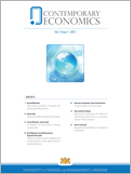A Monetary Analysis of the Liquidity Trap with an Application to the USA
A Monetary Analysis of the Liquidity Trap with an Application to the USA
Author(s): João Braz Pinto, João Sousa AndradeSubject(s): Business Economy / Management, Financial Markets, Public Finances, Fiscal Politics / Budgeting
Published by: Akademia Ekonomiczno-Humanistyczna w Warszawie
Keywords: Liquidity trap; money supply; monetary base multiplier; ARIMA; VAR and VECM models;
Summary/Abstract: Keynes emphasized a specific situation in which the liquidity preference becomes absolute, leading to monetary policy ineffectiveness when nominal interest approaches the zero-bound rate. This situation was termed a liquidity trap (LT) by Robertson and was popularized by the HicksHansen framework (IS-LM). Early macroeconomic textbooks characterized the LT as the Keynesian case against the classical one. The “lowflation” environment experienced in the USA and Europe again brought the LT to the forefront. The quantitative easing monetary policy was introduced in Japan and better applied in the USA and EMU as a solution to overcome the LT. The macroeconomic mainstream contends that the LT is essentially a money demand problem, whereas we propose another interpretation; the current situation should be interpreted as a “banking problem” that impedes the transformation of the monetary base into money supply. To prove our thesis, we study the behavior of the USA money multiplier and the income velocity of money by comparing an earlier period with the 2007-2008 crisis period. Using a VAR and a VECM model, we compare the normal situation of monetary policy efficiency with the situation of LT monetary policy inefficiency. We prove that the LT focus should not be placed on the demand for money but rather on the behavior of the money supply – more specifically, on banks’ behavior leading to the transformation of the monetary base into the money supply.
Journal: Contemporary Economics
- Issue Year: 13/2019
- Issue No: 4
- Page Range: 446-470
- Page Count: 25
- Language: English

